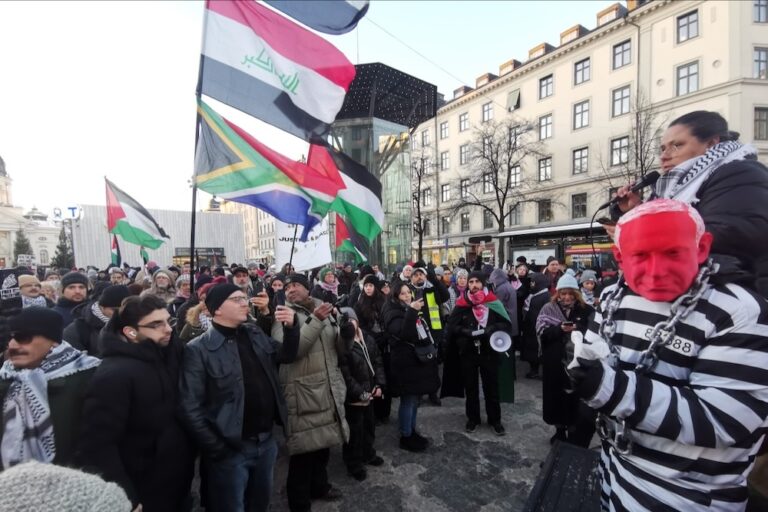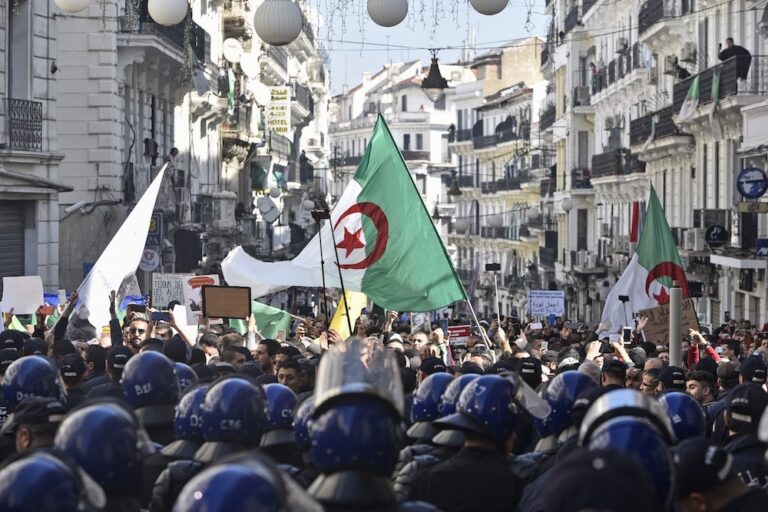The following is Part 2 of the IPI World Press Freedom Review: EUROPE All across Europe’s varying media landscape, barriers to freedom of expression exist in numerous shapes and forms. Whether in the shape of murder, or the form of excessive libel judgements, the objective is the same: the quelling of undesirable ideas and information. […]
The following is Part 2 of the IPI World Press Freedom Review:
EUROPE
All across Europe’s varying media landscape, barriers to freedom of
expression exist in numerous shapes and forms. Whether in the shape of
murder, or the form of excessive libel judgements, the objective is the
same: the quelling of undesirable ideas and information.
In the Federal Republic of Yugoslavia, the Serbian Parliament adopted a
draconian Law on Public Information this year which bans re-broadcasting of
foreign programmes, gives the authorities numerous powers to curtail and
stifle the media and levies exorbitant fines on offending media with a
24-hour deadline in which to pay. Flaunting accepted standards of justice,
the media are deemed guilty as soon as they are charged for a misdemeanour,
until they prove the contrary. The latest escalation of the government
attack against the independent media comes as a direct result of the
conflict in Kosovo. In October, the FRY authorities basically declared war
against media that tried to objectively cover the developments in Kosovo.
Journalists have been frequently harassed, beaten or threatened. Afrim
Maliqi, 31, the Pristina journalist for Bujku, was killed in an ambush on
his car on December 2. The assailants who were masked, shot at the car
and killed all three passengers. Maliqi had told colleagues that he feared
for his life because he believed he was being followed. He had been a
journalist for seven years and wrote a cultural column which had often
criticised Serbian policy towards the Albanian language community. Many
foreign correspondents were denied entry visas to Kosovo or had their
application ignored. Several who obtained visas were denied access to
certain areas within Kosovo. Serbian police have even torn up the
accreditation of several foreign journalists, warning them that they could
“become targets” if the international community imposes sanctions on the
Federal Republic of Yugoslavia.
The obstacles facing the media in Russia are manifold: assassination is
still tragically used to good effect to silence unwanted voices; cases of
intimidation and harassment are commonplace; the ‘oligarchs’ blithely
manipulate the media for personal gain; and a Communist-led Duma introduces
legislation to censor and control. Murder has shown itself to be the
preferred method of censorship in at least five cases in Russia this year.
In perhaps the highest profile case, Larissa Yudina, editor-in-chief of the
daily Sovietskaya Kalmykia, was kidnapped and murdered in Elista, the
capital of the Russian Republic of Kalmykia, in June this year. An unknown
person claiming to be a representative of the Agency for Co-development –
reporting to the President of Kalmykia – had made an appointment with the
journalist. He was to give her documents on the misappropriation of funds,
which implicated the President of the Republic, Kirsan Ilyumzhinov. The next
morning her body was found with several stab wounds in a dam in the town.
Yudina was also regional vice-president of the opposition party Yabloko. Her
newspaper was in constant conflict with President Ilyumzhinov, who is also
an influential businessman. Sovietskaya Kalmykia has published numerous
articles criticising his authoritarianism and denouncing the corruption and
misappropriation of funds under his presidency. Sovietskaya Kalmykia, the
only opposition newspaper in Kalmykia, has often been threatened with
closure by authorities. Since 1993, Yudina had also received numerous
threats due to her articles on the wealth and personality of President
Ilyumzhinov.
In Georgia, the brutal murder of Georgy Chanya, a 25-year-old journalist
with the Tbilisi newspaper Rezonants, was a painful reminder of the ultimate
price that correspondents covering conflict are sometimes forced to pay.
Chanya was covering the conflict in the break-away region of Abkhazia. His
body was mutilated beyond recognition. Fourteen journalists have been killed
in the former Soviet republic of Georgia since 1992.
In Albania, 5 kilograms of explosives were left outside the home of Zenepe
Luka, a correspondent for Koha Jone. Her two children and two young
neighbours were slighted injured. According to local police, the attack was
designed to “physically eliminate the family of Zenepe Luka, but also
targeted freedom of the press.”
The fall of Prime Minister (and acting President) Vladimir Meciar in
Slovakia this year was warmly welcomed by the private press. Prior to the
elections in September, Meciar implemented the highly contentious Election
Law permitting only the state-funded media to broadcast activities relating
to political campaigns during the 30-day official campaign period. Meciar’s
rule was notable for his systematic attempts to impose barriers to the free
flow of information.
Ukraine’s Information Ministry deemed it appropriate to suspend an
opposition daily, for a technical error on its registration form, two months
before a parliamentary election. The paper, Pravda Ukrainy, had seen its
circulation increase from 70,000 to over 500,000 in a few months. The
popular opposition daily, Vseukrainskiye Vedomosti, was also forced to stop
publishing this year after losing a controversial libel case to a
government-tied sports organisation for about US$1.8 million. Unpunished
violence against the media, including grenade and gun attacks, has also been
all too common in Ukraine.
The media situation deteriorated so dramatically in Azerbaijan that 19
editors of independent and opposition newspapers felt compelled to go on a
hunger strike to protest a renewed governmental campaign against the media.
Exorbitant fines were regularly handed out to journalists who had “insulted”
the “honour and dignity” of the President or inflicted “moral damage” on
high-ranking officials; amounts that seem intent on closing down, not
punishing, the critical papers. Additionally, over 100 cases of police
violence against the media were reported in Azerbaijan in 1998.
The Belarussian autocratic leader, Alexander Lukashenko, introduced a series
of repressive legal measures this year, exacerbating the already dire media
situation in Belarus. The official policies of refusing information to the
private press and prohibiting state institutions and enterprises from
placing advertisements in the non-state press were exposed. In
Bosnia-Herzegovina, criminal libel cases reared their ugly head for the
first time. Furthermore, many incidents of media intimidation and harassment
were reported throughout the course of the year.
Despite widespread domestic and international pressure, the Bulgarian
Constitutional Court ruled that articles in the Penal Code that provide for
prison terms for journalistic offences do not contradict the Constitution.
The composition of the new National Council for Radio and Television has
been particularly controversial as opposition leaders claim the body is
dominated by government appointees. Also in Bulgaria, the leading daily
Trud, which has a reputation for investigative crime reporting, came in for
attack in 1998. Its offices were bombed, many of the staff received
threatening phone calls, and in a
particularly disturbing incident, Ana Zarkova, an award-winning
investigative reporter with the daily, was attacked by an unknown assailant
who splashed her with acid, badly burning her face, left eye, neck and arms.
Romanian officials also have a penchant for using criminal libel and a
corrupt judicial system to avoid scrutiny and criticism. Huge fines and
prison sentences have been handed out to investigative journalists this
year.
The Croatian authorities also continued their legal war of attrition on the
independent media. President Tudjman and his sensitive associates slapped
hundreds of civil and criminal libel suits on journalists and editors. These
cases are having an extremely detrimental effect on the press as the legal
process is time-consuming, costly and the threat of excessive awards and
imprisonment lingers on. An amendment to the law on Croatian
Radio-Television which ignored many international recommendations was widely
criticised.
The Greek authorities are using draconian libel legislation to muzzle
critical journalists. Despite the fact that Greece has signed and ratified
several international treaties guaranteeing freedom of expression, the
country is quickly isolating itself from its fellow European Union member
states by punishing journalists with prison sentences. Freedom of the press
has also been curtailed in many established democracies in Western Europe
this year. In Luxembourg for example, for the first time in the country’s
history, the offices of a newspaper were searched by police in connection
with an article on the Minister for the Interior. The police also demanded
that the editor-in-chief reveal his sources of information.
A daily newspaper with links to Basque terrorists was shut down in Spain.
In France, police detained three journalists for questioning and confiscated
some of their documents as part of an investigation into an assassination.
In particular, the confiscation of the materials sparked controversy as it
is seen to be in clear violation of the journalists’ right to protect their
sources of information. While Article 109 of the French Penal Code
guarantees a journalist’s right to protect sources of information, this
right is suspended if the journalist is held for questioning. Also in
France, throughout the year several photographers and cameramen who had been
covering demonstrations were manhandled and questioned by police officers.
Their camera film was often confiscated leading to speculation that the
French authorities feared the impact the images might have on the public.
OCEANIA AND AUSTRALASIA
While media problems persist in this region of the world, the guiding
principle that everyone has the right to seek receive and impart ideas and
information is generally respected. Compared to other regions in the world,
the threats to free expression in Australasia and Oceania are, happily,
relatively minor. The Australian government did not relax cross-media and
foreign ownership rules this year, despite the pressure exerted by media
magnates, Kerry Packer and Rupert Murdoch. The ownership of Australia’s
untrammelled media is already among the most concentrated in the world.
Fiji has one of the freest presses in the region, however, some
parliamentary members tend to react badly to some embarrassing reports. The
biggest daily newspaper, The Fiji Times, was found guilty this year of a
breach of parliamentary privilege for reporting on the cost of a senatorial
meeting.
Reflecting a global media concern, New Zealand’s journalists are struggling
with the privacy issue. Current legislation struggles to find an acceptable
balance between rights relating to privacy and other rights relating to
freedom of expression. The reporting of suicide also continues to be a
thorny issue in New Zealand, which has one of the highest rates of youth
suicide in the world. The current laws restrict the media from reporting on
specific cases for fear that the reports will encourage other people to
follow suit.
Papua New Guinea has a robust and essentially free news media. Peace
agreements in the secessionist war on the island of Bougainville have eased
tensions considerably. There were, however, reports of intimidation of the
media by government supporters.
The Samoan government made several efforts this year to curb freedom of
information and expression. Opposition leaders remained barred from the
government-controlled national radio and television services. Civil and
criminal court actions against the country’s main independent news voice,
the daily newspaper Samoa Observer continued. The Government also decided
that the legal costs incurred by Government ministers and senior officials
who sue the news media would be paid from public funds. Additionally, a
Government minister was alleged to have made death threats against the
assistant editor of a weekly newspaper.
Libel remains a criminal offence in the kingdom of Tonga and is used by
sensitive officials as retaliation for critical reporting. An Agence France
Presse reporter was refused entry to Tonga on the grounds that his reports
insulted the King.
In Vanuatu, following disclosures by the Ombudswoman that leading
politicians took large loans illegally from a national retirement scheme for
workers, rioters temporarily forced the government-run radio and TV
stations, Vanuatu Broadcasting Corporation, off the air. A journalist was
assaulted and equipment was damaged. Reports of ministerial misconduct were
not being carried for a time on the important local language service of
government-owned Radio Vanuatu. Staff had been reportedly threatened by a
prominent politician.
The small South Pacific island of Wallis was the scene of one of the year’s
most dramatic moments for the region’s media. Angry villagers took over the
RFO (Societe Nationale de Radio Television Francaise d’Outre Mer) television
and radio stations which serve the French Pacific territory of Wallis and
Futuna. They briefly held hostage the manager and two editors. They occupied
the stations and kept them off the air for seven days. The villagers were
protesting RFO’s response to complaints other villages got more air time
during coverage of traditional ceremonies, which are major events in these
islands where culture and tradition are still strong.


